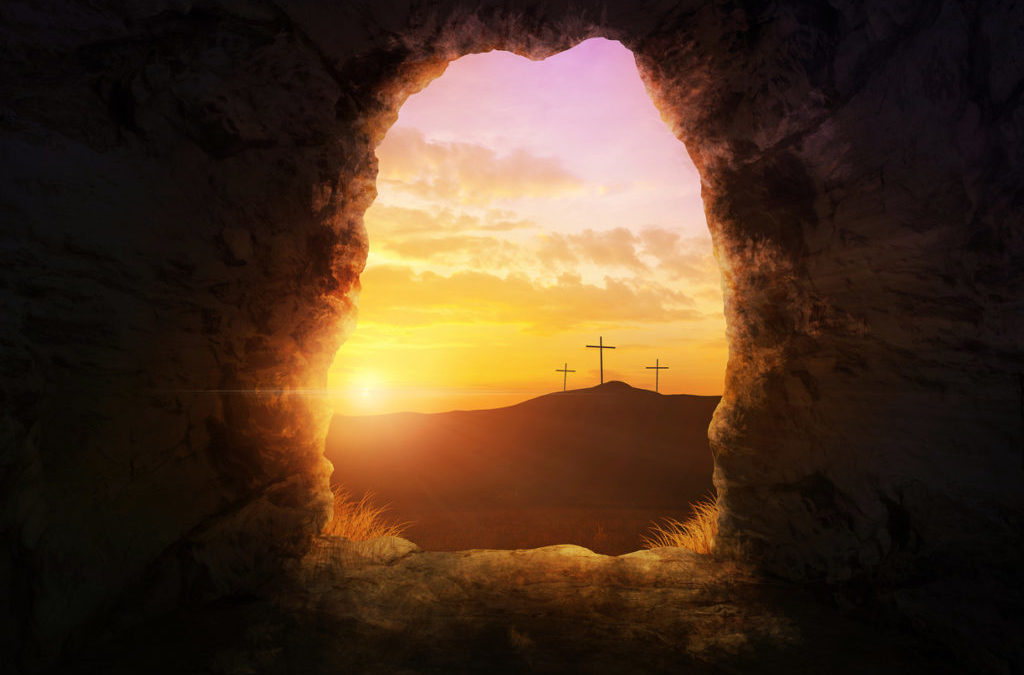Dear New Hope,
A week from today is Good Friday. The reason why we can call Friday “good” is because Jesus conquered the grave on Easter Sunday. As the old hymn says,
Up from the grave He arose,
With a mighty triumph o’er His foes,
He arose a Victor from the dark domain,
And He lives forever, with His saints to reign.
He arose! He arose!
Hallelujah! Christ arose!
As we consider what happened to our Lord Jesus almost 2,000 years ago, let your mind be awestruck by what transpired on that fateful weekend.
He died…entirely.
Seriously, he died. After all the agony and suffering, Jesus died. His heart stopped and his blood stopped flowing. He flat lined. His major organs failed. Air left his lungs and he breathed his final breath. The glory of the Son of God was eclipsed by the power of the prince of darkness.
In the movie “The Princess Bride,” after Wesley suffered deadly injuries, one man humorously encouraged the others: “It just so happens that your friend here is only mostly dead. There’s a big difference between ‘mostly dead’ and ‘all dead’…Mostly dead is slightly alive.”
As we consider the death of Jesus, it is important to understand that He really was “all dead.” He wasn’t mostly dead. He wasn’t slightly alive. The King of the Universe suffered at the hands of men and he was all dead. And so he remained for 3 days.
The timing is significant because in Jewish tradition, it was the 3rd day after death that a person was considered fully and finally dead. Everyone in that day knew that Jesus was not in a coma. He was all dead and was not coming back to life. “There in the ground, His body lay; light of the world by darkness slain.”
He arose…bodily.
When Jesus rose, he literally stood up physically. He did not rise up as a ghost or a spirit. The disciples did not hallucinate when they saw Him. Jesus appeared bodily over the course of 40 days, talking, eating, drinking and capable of being touched. His heart which had stopped beating, began to beat again. His blood, which had stopped flowing, flowed again. His flesh, which had started decaying, reversed the decay process. His body, which had been laid lifeless in a tomb, rose in fullness of power. This was His new resurrected body, yes. But it was still Jesus’ body, which He now inhabits for all eternity.
One Christian author writes this about the power of Jesus’ resurrection:
- “New life after a period of being dead.”
- “Renewed bodily life among the living.”
- “Reversal of death itself.”
- “The reversal or undoing or defeat of death.”
- “With the resurrection itself a shock wave has gone through the entire cosmos.”
- “Death itself has been defeated. Not redefined; not understood in a different light; defeated.”
We shall raise…as He was raised.
The great hope of the Christian is that since Jesus was raised, we too shall be raised. Our future resurrection, which will be physical and bodily in nature, has yet to happen to any believer. We live between resurrections: that of Jesus and that of our bodies. Like Jesus, we will receive a new body restored to full health and vitality. But make no mistake, it will still be our body.
Consider the implications of knowing that our eternity will not be an ethereal, ghost-like existence of floating on the clouds with angels. Rather, we shall inhabit redeemed and restored bodies, capable of touching, hugging, eating, drinking, and all the glorious physical senses we enjoy today.
Think of it this way. The last scene in the book of Revelation is not believers ascending to a far off heavenly existence in the clouds, but rather the Kingdom of God descending as God makes His dwelling with us on a restored earth.
As we celebrate Good Friday and Easter Sunday, we do so with hope of resurrection. Our hope is firmly grounded in the past because Jesus conquered the grave and rose to life. And it is a hope focused on the future when those of us in Christ shall also rise bodily where we will dwell with the Lord forever.
Rejoice. The King has risen. And we too shall raise.













